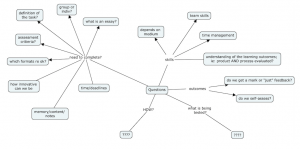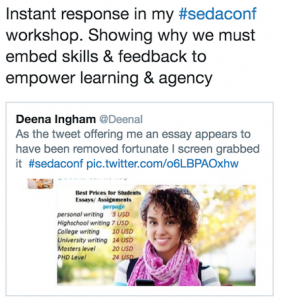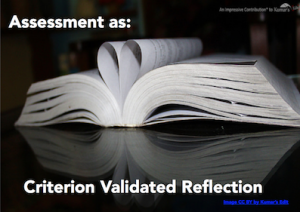Linking Skills, Feedback,
and
Assessment to develop Student Agency and Achievement
That was the title of my workshop at the SEDA (Staff and Educational Development Association) Conference on Assessment & Feedback and I had great fun. There were 40+ in the room and the plan was to talk to them for the first bit, presenting core ideas and a context for assessment. Then we broke into five groups, around tables and I gave them the brief to write an essay based on the information given so far…
What happened next was very interesting indeed. Everyone did something very different to what I expected. In my naive mind, I imagined that people would ‘get on with the task’ and just write an essay.
This was the beginning of a fantastic lesson for me. I know I was presenting, but I was learning.
There is often a disconnect between what the teacher knows and says, or expresses, and what the student receives. Phil Race and I were chatting after the session about the way feedback is received, and how in any one-way conversation, as in when reading typed words, there is no control or view into how the words sound, how the person reads them, and what impact those words have in the context of where and when that person reads them. (Take a simple example of saying ‘goodbye’. Just as someone saying that as the taxi takes her friend to the airport will hear that very differently to how it sounds when the train conductor says ‘goodbye’ as someone steps off the train to how it sounds when you thank the neighbour for bringing your parcel over and say ‘goodbye’ as they go back to their house. Context, inflection, setting – even the weather can change how someone reads something.)
I had thought that, well, I introduced several topics in the presentation so far: self-efficacy, student agency, self-regulated learning, and had contextualised learning and assessment as often happening in a very traditional setting. Then I gave out two paragraph quotes – one from my book Fostering self-efficacy in higher education students, and one from a blog by Howard Scott about the need to make learning a transition between school and life, which integrates practical elements. The blog passage had several academic references in it. In my mind, I had given them a selection of topics that they could use or string together, and the beginnings of some research (or at least clues of where to find supporting material via the references and reading passages) that could be used to connect ideas and support an argument about a chosen aspect of the topics and how they related to assessment…
but nobody in the room got exactly that. *sigh*
Understanding what is asked of you is something that a teacher should never assume is obvious. I am pretty good at explaining, and I know that I expected people to make some jumps, but that was a really good lesson for me. -I was in a conference on feedback and assessment and people came to the task with their ‘teacher brains’. I also was hoping for a general sense of ‘huh? how do we do that?‘ and that came through loud and clear.
They had awesome discussions – and came up with so many angles and questions galore. What’s the title? What are the criteria? What else are you really looking for? (oh my ! a hidden agenda?!?! …cue the tumbleweeds as I looked blank at their reactions… I just planned for an essay!)
One group produced this:
Someone tweeted something about an essay and within seconds had an offer from someone providing an essay writing service. The mind boggles, but really I’m not surprised. If you were in a huge class, why would the lecturer know if you really wrote it? Unless they knew something about your writing and had fed back so they could see the change, the improvement…
One antidote to that is to embed the skills in the sessions another is to change the actual assessment.
Consider what skills are being assessed? Do the skills being assessed match the mode of assessment? Can they? Can the two ideas be integrated? If you are assessing writing, do they have training in writing? Is is embedded as a regular task into the course? Do they feed back to one another? One person said that it is important to consider time management and ease of getting the task done, and a few people chuckled, but that’s a serious point – If my students are learning presentation skills, but I also want them to articulate themselves in writing clearly, then it doesn’t make sense for me to have essays and 40+ presentations as well, but could I require them to embed a 60-90 second video vignette in the essay somewhere, or alongside the essay? Producing a clear piece to camera is tricky and may well hold students in good stead when they encounter an interview situation. What about time-stamping comments and feedback within video submissions so students can engage with the comments? We need to teach skills so that they can be confident when it comes to accomplishing tasks. Someone else mentioned the passivity that creeps into higher education settings, and how this is so contrasting from a school classroom where students are seen with hands up asking – I don’t really understand? Can you explain that? -or they ask someone else.
Ah! These are self-regulated learning behaviours – seeking assistance, asking different people for help. With the essay writing task people are using research and writing skills, gathering information, creating coherent points, learning to support arguments through analysis and integration of other ideas (from published research). Skills, skills, skills…
I really really think assessment should be part of an ongoing cycle of learning – I proposed assessment as criteria validated reflection, and that means that assessment is definitely not the end. If I value what I do then I need assessment (reflection) to improve and go on. Today, I used the feedback that I received from people’s responses to help me question, evaluate, and reflect on my own ability to communicate clearly, and I will take it back and consider how I can improve, and how I can use some of the ideas put forward. That’s learning. I’m reflecting and assessing as part of a cycle.
My slides are HERE all the images are CC licensed. If you use any of them please share alike CC BY-SA
At the end of the session I asked for examples of how relevant skills could be integrated into assessment, and these are from a range of disciplines – spoken and recorded with permission (embedded below). You’ll hear there’s a strong advocacy from one person to keep essays, and I (with my adoration of all things grammatical) could not agree more that students need to be taught to articulate themselves clearly, research, ( <– Oxford comma) and contribute to the wider body of academic discourse, but I do advise a balanced diet of assessment.
I would love to extend the conversation, and I’m still learning. Comments, suggestions, and questions are most definitely welcome and even invited.





Pingback: SEDA Conference on Learning and Assessment (May 2016) | Fabio's Higher Education Journey
Hi Laura, thanks for the session, and for this rapid reflection from yourself. Having read your thoughts, what really strikes me is the gulf that there can be between the tutor’s perceptions / expectations and the understanding of the group / students. I’m referring here to your “but nobody in the room exactly got that *sigh*”. I am sure that that is often the case with assignments; students just don’t get what the tutor is really after. This strengthens further the need for a clear assignment brief, but ALSO for extended dialogue between tutor and student around the assignment ‘task’. (Fig 1 in O’Donovan et al (2004).
http://www.tandfonline.com/doi/pdf/10.1080/1356251042000216642
Yesterday, the ‘brief’ was mixed in with lots of background information and creative ideas, and so to some extent was ‘obscured’. But the ensuing discussion was a good example of the sorts of discussions that it would be useful to have around any assignment task.
The session also gave me some ideas about further incorporation of video / audio clips. Enjoy today – I am following on twitter!
Thank you Peter! It was great to have you there and loved the impromptu video in the discussion… learning all around us!